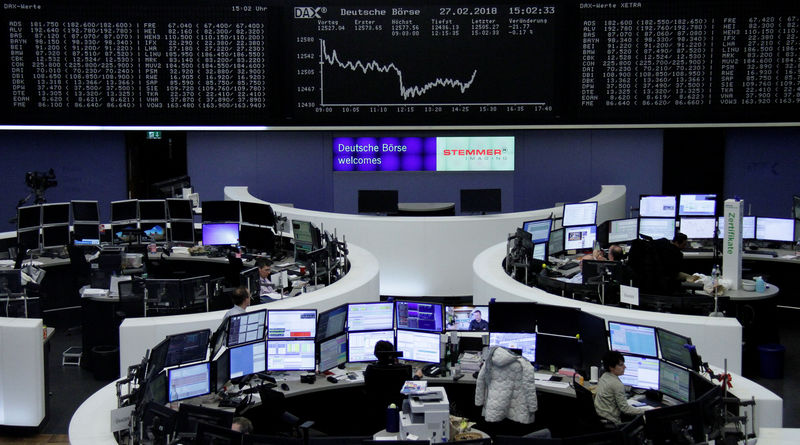By Julien Ponthus
LONDON (Reuters) - European share indexes will by the end of the year revisit the levels they hit in January before diving in February on fears of inflation and interest rates rising faster than expected, particularly in the United States, a Reuters poll showed.
Shares are seen bouncing back on strong corporate earnings and global growth, the poll of strategists showed. They said the factors that supported European markets in 2017 will keep doing so even if the market is now more volatile.
The poll of more than 30 brokers, fund managers and analysts taken over the last two weeks showed the pan-European STOXX 600 index (STOXX) is expected to reach 405 points at the end of 2018, against a year-high of 403.7 points on Jan. 23.
That would mean a 4 percent rise for the year, much smaller than 2017's 7.7 percent gain. Compared with Monday's close it would mark a 5.7 percent improvement.
For the euro zone's blue-chip Euro STOXX 50 index, (STOXX50E) the expected rise on the year is 5.6 percent, 6.8 percent up on Monday's close.
"What Anglo-Saxons call Goldilocks has ended; we're entering a new period now", said Warin Buntrock, deputy chief investment officer at BFT IM, evoking the "not too hot, not too cold" analogy used to describe a satisfactory pace of economic growth which does not fuel inflationary fears.
After years of ultra-loose monetary policy, the U.S. Federal Reserve is expected to raise interest rates three times in 2018 and the Bank of England possibly twice, while the European Central Bank is set to end quantitative easing by the end of the year.
With bond yields now catching up to this new environment, the so-called "equity risk premium" -- the price paid to compensate for taking the risk of investing in stocks rather than in bonds -- has had a negative effect on stocks.
Buntrock said he expected European shares to grow at around the same pace as corporate earnings, that is roughly 10 percent, with little or no inflation on the earnings multiples used to value shares.
This new economic environment will be much more prone to market volatility, which had stabilized at record lows in 2017.
The Reuters poll also shows investors are bracing for much less stable markets, with the VIX index (VIX), a gauge of U.S. stocks volatility, rising through the year with occasional abrupt spikes.
While political risks remain in Europe, particularly in Italy which holds a general election on Sunday, investors take the view that they are unlikely to affect markets over the year.
Milan's FTSE MIB (FTMIB) is seen rising almost 10 percent in 2018 while Germany's DAX (GDAXI) would go up over 7 percent. France's CAC (FCHI) will end the year 4.1 percent higher than it started it.
Britain's FTSE (FTSE), which equity strategists believe could suffer from lower growth and the country's exit from the European Union, is the only indicator seen closing 2018 with a negative performance, down 2.4 percent.

(To read other stories from the Reuters global stock markets poll)